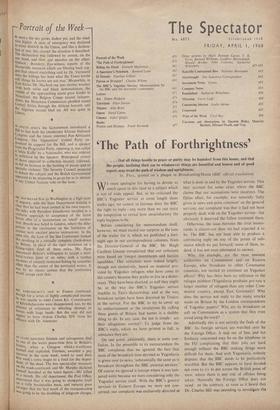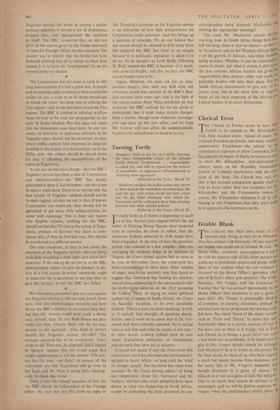`The Path of Forthrightness
. . . that all things hostile to peace or purity may be banished from this house, and that the people, inclining their ear to whatsoever things are beautiful and honest and of good report, may tread the path of wisdom and uprightness..
Sr. PAUL, quoted on a plaque in Broadcasting House (BBC official translation) WI. must apologise for having to devote so much space in this issue to a subject which is not of wide appeal. But, as we criticised the BBC's Yugoslav service at some length three weeks ago, we cannot in fairness deny the BBC the right to reply—any more than we can resist the temptation to reveal how unsatisfactory the reply happens to be.
Before considering the memorandum itself, however, we must record our surprise at the tone of the trailer for it, which we published a fort- night ago in our correspondence columns, from the Director-General of the BBC. Mr. Hugh Carelton Greene complained that our criticisms were based on 'émigré resentments and faction squabbles.' Our criticisms were indeed largely, though not exclusively, based on material pro- vided by Yugoslav refugees who have come to this country because they prefer to live in a demo- cracy. They have been shocked, as well they might be, at the way the BBC's Yugoslav service truckles to Tito's dictatorship; and at the way. broadcast scripts have been distorted by Titoists in the service. For the BBC to try to cover up its embarrassment at the revelations by calling these guests of Britain bad names is a shabby thing to do. In any case, the test is simple: are their allegations correct? To judge from the BBC's reply, which we have printed in full, in substance they are.
On one point, admittedly, there is some con- fusion. In the preamble to its memorandum the BBC complains that we ignored the fact that most of the broadcast time devoted to Yugoslavia is given over to news, 'substantially the same as is broadcast throughout the BBC external services.' Of course we ignored it (except where it was tam- pered with) because we were considering only the Yugoslav service itself. With the BBC's general services to Eastern Europe we were not con- cerned; our complaint was exclusively directed at what is done in and by the Yugoslav service. This may account for some cases where the BBC claims that our accusations were incorrect. The Djilas affair, for example, was naturally 'fully given in news and press comment' on the general services; our complaint was that it had not been properly dealt with on the Yugoslav service—for obviously it deserved the fullest treatment there.
Otherwise, the issue between the rival memo- randa is clearer-cut than we had expected it to _ be. The BBC has not been able to produce a convincing reply on any of the points of sub- stance which we put forward; some of them, in- deed, it has not even attempted to answer.
Why, for example, are the most eminent authorities on Communism and on Eastern Europe, who broadcast to other Communist countries, not invited to comment on Yugoslav affairs? Why has there been no reference to the refugee problem (Yugoslavia produces pro rata a larger number of refugees than any other Com- munist country, except East Germany)? Why does the service not reply to the many attacks made on Britain by the London correspondents of Yugoslav papers? Why are its broadcasts so soft on Communism as a system that they even avoid using the word?
Admittedly this is not entirely the fault of the BBC. Its foreign services are watched over by the Foreign Office. A step out of line, and the Embassy concerned may be on the telephone to the FO complaining that their jobs are hard enough without the BBC making things more difficult for them. And with Yugoslavia, nobody disputes that the BBC needs to be particularly watchful. But the BBC appears to have decided not even to try to put across the British point of
view, where there is any risk of offence being taken. Naturally the Foreign Office does not mind: on the contrary, as soon as it heard that Dr. Charles Hill was intending to investigate the Yugoslav service, the better to answer a parlia- mentary question, it let out a cry of displeasure, stopped him, and appropriated the question to itself. The BBC complains that we did not print all the answer given by the Under-Secretary of State for Foreign Affairs on that occasion. The answer was so puerile that we would not have bothered printing any of it, except to show how useless it is to have an 'investigation' by an in- terested party to a dispute.
The Corporation did not need to send us this long memorandum if it had a good case. A simple and devastating reply would have been to send the scripts of, say, a score or so of recent broadcasts in which the writer has been free to criticise the Tito regime—and we do not mean attack the Tito regime. The BBC is justified in refusing to allow these services to be used for propaganda in the style of Radio Madrid. But this does not mean that the democratic case must never be put for- ward: or that false or malicious criticisms in the Yugoslav press should not be answered; or that, where public opinion here expresses its deep-felt hostility to the cruelty of a dictatorship--as in the Djilas case--the subject should be played down for fear of offending the susceptibilities of the rulers of Yugoslavia.
As for our second main charge—that the BBC's Yugoslav service has been a nest of Communists and fellow-travellers—the BBC has hardly attempted to deny it. Let us repeat : our aim is not to start a witch-hunt. There is no reason why the first loyalty of Yugoslav subjects should not be Io their regime; all that we ask is that, if known Communists are employed, they should not be permitted to get away with mistranslations, let alone with espionage. Nor is there any reason why English citizens, working for the BBC, Should not feel that Titoism is the saving of Yugo- slaVia, perhaps of Europe; but there is every reason why, if they do feel that way, they should be transferred to a different service.
Our real complaint, in fact, is not about the members of the Yugoslav service, who are doing their duty according to their lightsjaut about their superiors. If the aim of the service is, as the BBC memorandum claims, to give its listeners 'a pic- ture of a free society in action' somebody ought to supervise the programmes to see that they do give this picture; in this the BBC has failed.
* We have never pretended that our case against the. Yugoslav service is 100 per cent. proof. Even now, with this memorandum revealing just how flimsy the BBC's defence is, we cannot help feel- ing that Mr. Greene could have made a better case, himself, than the one Bush House has pro- vided for him. Clearly there can be no easy answer to the question : what kind of service should the Yugoslav section provide? The strategic question has to be considered: Tito's value to the West may be disputed, but it cannot be ignored. Against this, we would argue that simple appeasement is not the answer. Tito can- not live for ever : and then? At present all the indications are that Yugoslavia will go over to the East; and the West is doing little, ideologi- cally, to check that trend.
There is also the related question of how far the BBC should be independent of the Foreign Office; the fact that the FO chose to reply to Mr. Donnelly's question on the Yugoslav service is an indication of how little independence the Corporation really possesses. And this brings up a question of principle. We do not believe that the service should be allowed to drift away from the standard the BBC has tried to set simply because it is politically expedient to allow it to do so. To be upright—as Lord Reith, following St. Paul, wanted the BBC to become—it is neces- sary to be forthright : and this, we fear, the BBC can no longer claim to be.
Again, therefore, we must ask for an inde- pendent inquiry. One such was held after our criticisms (much less serious) of the BBC's Rus- sian services three years ago; and in the light of the memorandum Peter Wiles produced on that occasion, the BBC realised (so we are given to understand) that it must make certain changes. Only a similar, though more elaborate, investiga- tion can clear up this new affair; and we hope Mr. Greene will not allow his understandable loyalty to his subordinates to stand in its way.



































 Previous page
Previous page